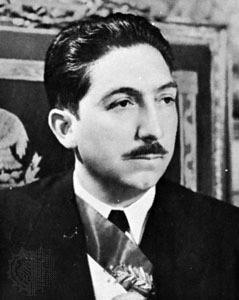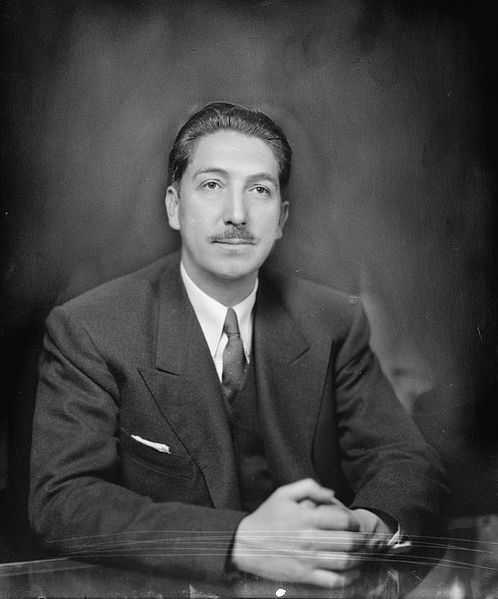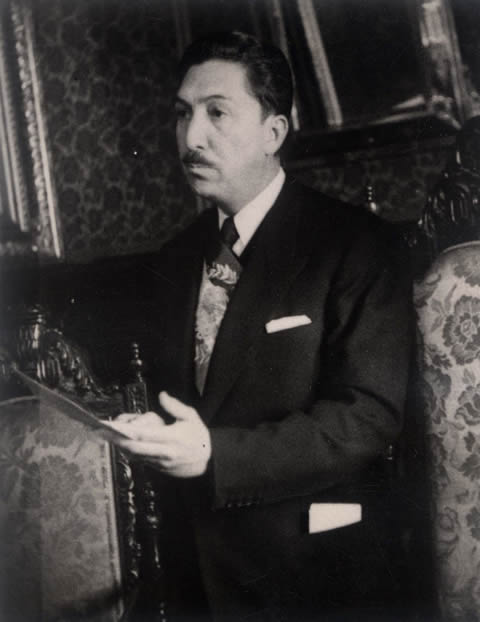<Back to Index>
- Historian Mykhailo Serhiyovych Hrushevsky, 1866
- Painter François Boucher, 1703
- President of Mexico Miguel Alemán Valdés, 1900
PAGE SPONSOR



Miguel Alemán Valdés (September 29, 1900 – May 14, 1983) served as the President of Mexico from 1946 to 1952.
Alemán was born in Sayula in the state of Veracruz as the son of General Miguel Alemán González and Tomasa Valdés Ledezma. As a child, he was not permitted to attend school in his home town, due to his father's (a former revolutionary general) political beliefs, but studied in other areas instead. He attended the National Preparatory School in Mexico City from 1920 – 1925, and then went to the National School of Law until 1928, completing his law degree with his thesis on occupational diseases and accidents among workers. As a successful attorney, his first practice was in representing miners suffering from silicosis. He won two notable legal victories in defending workers against corporations. The first was in securing compensation for dependents of railroad workers who were killed in revolutionary battles; the second was to gain indemnities for miners injured at work, and gained favor with Mexico's labor unions.
Representing the Party of the Mexican Revolution (an earlier name of the party later known as the PRI), he served as Senator from the state of Veracruz from 1934 – 1936. When Manlio Favio Altamirano, the governor elect of Veracruz, was assassinated, Aleman accepted appointment as Governor of Veracruz from 1936 – 1939. From 1940 to 1945, he served as Secretary of the Interior under Manuel Ávila, after directing Avila's presidential campaign. Aleman ran for President in 1946 as candidate of the PRI, and was the winner of the elections held on July 7 of that year, defeating former foreign minister Ezequiel Padilla to become the first non military candidate to win the Presidency of Mexico. He was inaugurated as President of the Republic on December 1, 1946, and served until 1952.
In 1961, he was named president of the national tourist commission, and was influential in bringing the 1968 Summer Olympics to Mexico. As
president, Alemán pursued industrial development, increasing the
extension of the nation's rail network, improving highways, and
constructing a number of major schools. To accomplish this, in 1947 he
negotiated a major loan from the United States. Aleman became the first Mexican President to visit the United States, and he and U.S. President Harry S. Truman rode in a parade in Washington which attracted an estimated 600,000 well wishers. Internationally, he signed peace agreements with Japan, Germany and Italy following World War II, had a hand in a truce between Pakistan and India, and worked with the United States on the issue of the braceros. He
also worked extensively with irrigation and farming, greatly expanding
the national production of rice, sugar, bananas, coffee, oats, and
pineapple. In 1947 he initiated a huge project to control floods and
generate hydroelectricity in the state of Oaxaca, culminating with the opening of the Miguel Alemán Dam in 1955. In 1951, he oversaw completion of the diversion of the Lerma River, bringing to an end Mexico City's water supply problems. He faced the appearance of foot - and - mouth disease and
killed thousands of cattle in order to contain it. He gave women the
right to vote in municipal elections during his term, and in 1952,
elevated Baja California to state status. He played a major role in the development and support of the city of Acapulco, which is now well known all over the world as one of the principal tourist destinations in Mexico and Latin America. Rampant political corruption and crony capitalism would
mark his administration, and this would shape the relationship of
politics and big business in Mexico until the present day.